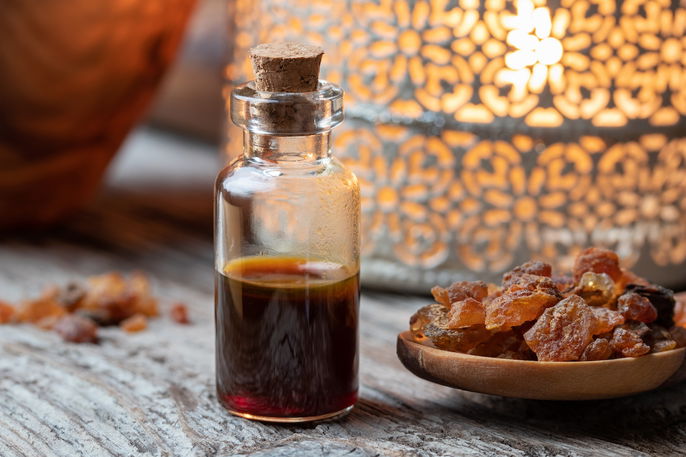Myrrh is a medicinal plant of the Commiphora myrrha species that contains antiseptic, antimicrobial and anti-inflammatory properties. It can be taken to treat a sore throat, gum inflammation, skin infections, acne or aging skin.
The part of myrrh that is typically used is its resin, which is extracted from the plant's branches. This is what contains most of the plant's medicinal properties, and is used to prepare essential oils or tinctures.
Myrrh can be purchased in compounding pharmacies and health food stores. It should be used as recommended by a doctor or medicinal plant specialist.

What it's used for
Myrrh can be indicated for treating the following conditions:
1. Sore throat
Myrrh contains anti-inflammatory, analgesic, antimicrobial, and antiseptic properties that can help to soothe a sore throat.
2. Gum inflammation
Myrrh can help to relieve gum inflammation, otherwise known as gingivitis, as it has naturally antiseptic and antimicrobial action.
Myrrh can also help to relieve mouth ulcers.
3. Cold sores
Myrrh has antiviral action that is effect against Herpes simplex virus type 1. It can help to reduce the severity of cold sores and reduce the duration of symptoms like stinging, burning or blistering.
4. Rheumatoid arthritis
Myrrh is rich in terpenes and sterols that have anti-inflammatory action, It can help reduce the production of substances that cause inflammation in the joints, which can play a role in managing the symptoms of rheumatoid arthritis or osteoarthritis.
5. Neuropathic pain
Myrrh can help to treat neuropathic pain, which is pain caused by inflammation or damage in the nerves. It can help to reduce pain due to its analgesic and anti-inflammatory action.
6. Respiratory infections
Myrrh contains terpenes and sterols which have antibacterial and antiviral action. Therefore it can be used to help treat respiratory infections like the flu.
Furthermore, myrrh has expectorant action that can help to relieve coughs caused by bronchitis or asthma.
7. Gastrointestinal problems
Myrrh can help to treat gastrointestinal problems, like indigestion or ulcerative colitis, due to its antispasmodic and anti-inflammatory properties.
8. Skin wounds
Due to its astringent, antiseptic and healing properties, myrrh can be used to help heal skin wounds.
Myrrh can also be used to treat acne, as it has antimicrobial action.
9. Aging skin
When used as a part of your daily skin routine, myrrh essential oil can help to prevent the appearance of wrinkles and fine lines.
However, this essential oil should not be applied pure to the skin. It should first be diluted in a moisturizer.
Despite the above health benefits, myrrh should not be used to replace the treatment prescribed by your doctor.
How to use
Myrrh can be found in the form of a tincture, essential oil or incense. It should not be swallowed as it can cause poisoning.
1. Myrrh tincture
Myrrh tincture can be gargled to treat sore throats, cold sores, gum inflammation or canker sores.
Ingredients
- 20 g of myrrh resin
- 100 mL of 70% alcohol
Directions
Grind the myrrh resin and place it in a clean, dry glass jar covered with aluminum foil. Add the alcohol and let it sit for 10 days, shaking frequently.
After this period, you can use 5 to 10 drops of myrrh tincture in a glass of water to gargle or rinse, 2 to 3 times a day. Do not swallow it as it is toxic.
2. Myrrh essential oil
Myrrh essential oil can be used as an air freshener, for inhalation for respiratory problems, or as a skin treatment.
- Room freshener: add 9 to 10 drops of myrrh essential oil and 250 mL of water in a spray bottle and spray as desired in the rooms in your house. You can also add 3 to 4 drops in an electric freshener.
- Inhalation for respiratory problems: add 2 drops of myrrh essential oil with a little water to a room vaporizer. This can be used to help eliminate phlegm in cases of bronchitis, colds or coughs.
- For topical use on the face: add 1 to 3 drops of myrrh essential oil to facial lotion or moisturizer. Use this daily to help refresh the appearance of your skin.
Myrrh essential oil can also be used to hydrate your hair. Mix 5 drops of the essential oil in 1 tablespoon of a plant-based oil and apply it to your hair.
You should avoid applying myrrh essential oil to sensitive areas such as your eyes and ears. You should also wash your hands with soap and water after handling the oil to avoid accidental contact with more delicate areas.
Possible side effects
Using myrrh may cause skin irritation or allergies when used in concentrations than are higher than recommended.
If ingested it can cause intoxication, with symptoms such as diarrhea, kidney problems, low blood pressure or rapid heartbeat.
Contraindications for use
Myrrh should not be used by pregnant women, as it can promote uterine bleeding and cause miscarriage. It should also be avoided by breastfeeding women.
Myrrh should also not be used by people with heart problems or diabetes, nor by those who take anticoagulants like warfarin.
Myrrh essential oil and tincture should not be ingested, as they are toxic if swallowed and lead to poisoning.
It is important to use myrrh for medical purposes as directed by a doctor or medicinal plant specialist.






























